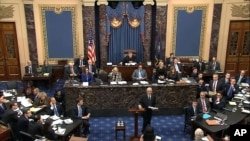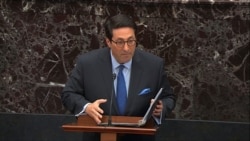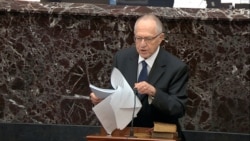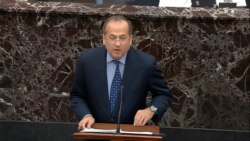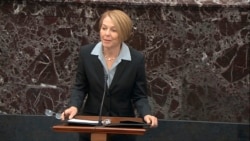Lawyers for U.S. President Donald Trump wrapped up their defense Tuesday at his Senate impeachment trial, strongly rebuffing claims that he withheld military aid to Ukraine to benefit himself politically.
Trump lawyer Jay Sekulow told the 100 senators acting as jurors, "We are clear in our position there was no quid pro quo" in Trump asking Ukrainian President Volodymyr Zelenskiy to investigate a key 2020 Democratic rival, former Vice President Joe Biden, at the same time he was temporarily blocking the release last year of $391 million that Kyiv wanted to help fight pro-Russian separatists in eastern Ukraine.
Sekulow offered his defense of Trump as the Senate weighs whether to subpoena the president's former national security adviser, John Bolton, to testify about his claim in a book manuscript that Trump told him directly last August that he was blocking release of the Ukraine defense assistance until he won assurances that Biden would be investigated. Bolton's claim undercuts the key Trump defense, that there was no reciprocal deal with Ukraine.
Sekulow said Trump had "a proper government interest" to investigate possible corruption in asking for the Ukraine investigations of Biden, his son Hunter's work at a Ukrainian natural gas company, and a debunked theory that Ukraine meddled in the 2016 U.S. presidential election that Trump won. No evidence has emerged of wrongdoing by the Bidens.
"He knew what he was saying," Sekulow said of Trump's July 25 conversation with Zelenskiy. "To say he's not acting in the national interest is wrong."
Sekulow's arguments came on the third and last day of president's defense that he should be acquitted of two articles of impeachment — abusing the power of the presidency and obstructing congressional efforts to investigate his Ukraine actions.
"These articles must be rejected," Sekulow said. "The Constitution requires it. Justice demands it."
White House counsel Pat Cipollone concluded, "This should end now, as quickly as possible."
For hours on Monday, Trump's lawyers ignored Bolton's claim. But late in the day, defense lawyer Alan Dershowitz dismissed the importance of it.
"Nothing in the Bolton revelations, even if true, would rise to the level of an abuse of power or an impeachable offense," he told the Senate, now in the second week of the impeachment trial.
With the Bolton claim throwing an unexpected element into the president's trial, Democratic opponents and two Republican senators called for his testimony.
A four-hour debate is expected Friday on whether to subpoena Bolton, whom Trump dismissed in September, and other witnesses familiar with Trump's Ukraine-related actions and documents held by the White House and government agencies.
Republican senators Mitt Romney and Susan Collins said Bolton's testimony would be important to hear, but Democrats need four Republicans to join them in a simple majority vote to approve the Bolton subpoena over the objections of the president's defenders.
Trump's Republican defenders have balked at calling Bolton as a witness.
"“I think, at this point, if you want to hear from John Bolton, you have to ask yourself, 'Is he a disinterested party? Is he a neutral party? Or is he someone who’s very unhappy — disgruntled, fired employee who now has a motive, a multimillion-dollar motive, to inflame the situation?'” said Sen. Rand Paul.
With the completion of Trump's defense, senators will have 16 hours over the next two days to question Trump's legal team and House managers who have prosecuted the case against the president.
Trump has often claimed that his call last year to Zelenskiy was "perfect." But another of his lawyers hedged Monday on that description.
"It would have been better in attempting to spur action by a foreign government and coordinate law enforcement efforts with our government to have have done so through proper channels," said Robert Ray.
But nonetheless, Ray said, "It is another thing altogether to claim that such conduct is clearly and unmistakably impeachable as an abuse of power."
"There can be no serious question that this president or any president acts lawfully in requesting foreign assistance with investigations into possible corruption, even when it might potentially involve another politician. To argue otherwise would be to engage in the specious contention that a presidential candidate, or for that matter any candidate, enjoys absolute immunity from investigations during the course of the campaign," he said.
Trump's lawyers sharply attacked Biden and his son's lucrative work for a Ukrainian natural gas company. They accused Democrats of improperly using impeachment as a weapon to get rid of a president they simply don't like, to overturn the 2016 election, and keep Trump off the ballot in November as he seeks a second term in the White House.
Kenneth Starr, a member of the president's legal team, called impeachment a political weapon that parties use against one another, and said House Democrats impeached Trump without any bipartisan support. Starr described impeachment as "hell."
Starr was the independent counsel whose investigation led to President Bill Clinton's impeachment in 1998 for lying to a grand jury about a sex scandal.
"Those of us who lived through the Clinton impeachment ... full well understand that a presidential impeachment is tantamount to domestic war. It is filled with acrimony and divides the country like nothing else," Starr said.
Another Trump attorney, Jane Raskin, attacked the Democrats for focusing on Trump’s personal attorney Rudy Giuliani, who they say was at the center of the president’s campaign to pressure Ukraine to investigate the Bidens.
Raskin called Giuliani a "colorful distraction" from what she says is the lack of evidence that Trump committed a crime. She said if Giuliani is such a central figure, why didn't the Democrats subpoena him to testify?
House committees subpoenaed documents related to Giuliani’s work in Ukraine, but he refused to comply.
House Intelligence Committee Chairman Adam Schiff, the lead Democrat among seven lawmakers from the House of Representatives serving as prosecutors in the case, said it was "amusing" for the Trump lawyers to label Giuliani a minor figure, and cited the Trump-Zelenskiy call.
"It wasn't the House that was on the phone with Zelenskiy as the president was, saying repeatedly that he wanted Zelenskiy to talk to Rudy," Schiff said. "Giuliani's name, I think, came up more than any other person's name in that call between the two heads of state. You've got to ask why was that, if he was such a bit player, as the president's team now would have you believe?"
A two-thirds vote in the 100-member Senate would be required to convict Trump and remove him from office. But with Republicans holding a 53-47 majority and no Republican calling for his ouster, Trump is all but assured of being acquitted.
Senate Majority Leader Mitch McConnell, who is opposed to calling witnesses that would extend the trial, is hoping to win Trump's acquittal by week's end, just ahead of Trump's annual State of the Union address to Congress next Tuesday.




